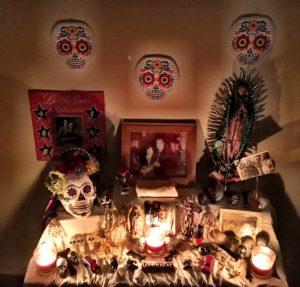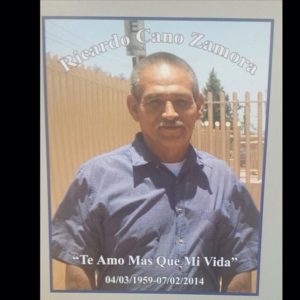So one thing that is bugging me is how did la Loca get HIV? Was I the only one scratching my head about this. I am not great at understanding literature but is this some kind of illusion of queerness, was there a subvert message about la Loca being queer that I did not get? Then who would have thought that Sofia would have had the courage to divorce Domingo? This goes back to the idea of the stereotypical Chicano family. Sofia is supposed to be happy with Domingo, even though her brain betrays her heart. Then when Domingo is back Sofia should have been excited to have her husband back, but in reality she is resentful of his departure. She tiptoes around the issue but then unexpectedly she asks Domingo to leave, is that is not a big enough sign of her agency she goes on to be the mayor of Tome and she founds her own, world recognized organization. MOMAS. Throughout the book Sofia does this delicate dance around Chicana womanhood. She is aware that her being left by Domingo puts her in a difficult situation, she understands what others would say if she brought a man into her house, and she knows what others think of women like her daughters. Through it all she defies social rules about womanhood. She takes on the responsibility of being the head of house, the business owner, and a mother. I just found it confusing that in the end she is organizes MOMAS, because women typically become martyrs themselves. I felt that Sofia, as a leading character, would fight patriarchy until the end. However, I think it is equally as important to note that there is no black or white scale when talking about progressive and conservative women, the truth is that there is a big spectrum and the progressive and conservative ideologies fluctuate and most importantly, it reminds me that the human species is full of contradictions.
Category Archives: Uncategorized
Blaxican Identity
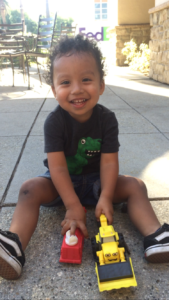
http://www.latina.com/lifestyle/our-issues/ode-being-blaxican-video
In the article ‘Ode to Being Blaxican’ illustrates the family structure of diverse ethnicities and cultures infused into a new generation of ‘mixed’ babies. Rush Davis is a product of his grandparents, a mixture of races, Mexican and Black. His grandmother Dolores Morado explains the changes in her daily life after marrying her black ‘knight,’ she was warned by her family that she had to be strong to fight against others remarks on her future children. She opens the video saying, “My thing was, be proud of who you are.Black, Brown, it dont matter, you are both” and she instilled in her children and grandchildren to be proud of their cultures. This short clip displays Dolores in her kitchen making a mixture of foods from the traditional African American dish such as fried chicken, corn bread with Mexican nopales dish with tortillas. She explains that she worked hard in showing her future generations that they did not have to identify to one race group. When her family relatives found out she was pregnant by a black man, her response to those who were not fond of her decision, “they can kiss my ass then” she replied to them. Her grandson Rush continues his ode, ” Dolores Morado, the brown goddess that laid our foundation with the Black king, to build bridges of light… her pride, and resistance” shows how essential it was for her to obtain a strong character. This family is an example of the increasing , Blaxican group, that is stuck between two different racial planes but they are able to find the balance between them.
My immediate family has always embraced other ethnicities and the youngest family member is Dominic, my two-year-old cousin who is Mexican and Jamaican. His father, Jon, considers himself Blaxican because his father’s family was Jamaican and his mother was Mexican, making Dominic 2nd generation Blaxican. We had attended the “Blaxican” talk at the Annenberg a couple months back and after the discussion, Jon said that he had similar experiences that the speaker had. He expressed that he was always asked to pick a side and during his high school race riots he decided not to side with either. He said he would have discussions with Dominic as he gets older, to help him realize that being Mexican and African American is perfectly okay and that he can embrace all ethnicities. Dominic will have a unique perspective because he will be raised around a predominantly Mexican family yet he will be educated on the struggles of both his brown and black family lineage. Having a Blaxican family member puts into perspective the ever-changing dynamics of race and family dynamics.
Week 13: Chicano History
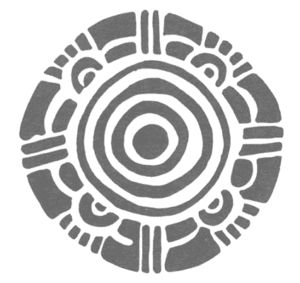
In this week’s reading, “Chicano History: An Oral History Approach” by Mario T. Garcia, he interviews a couple of people to understand their history. He argues that it is important to have first hand documentation of the Mexican experience in the United States. Mario states, “…innovative historians have begun to employ oral history techniques to compensate for non-existing working class documentation” (Garcia). This being so, Mario explains that they are techniques in order to perform a perfect interview. In the article, Ms. Donna Salazar has four interviews. Ms. Donna Salazar interviews two families, which were the Mendozas and the Sandovals. Ms. Donna Salazar interviews them about the Mexican life in the United States. Garcia states, ” It is important to analyze the interviews for both technique and content” (Garcia). Garcia explains that Ms. Donna Salazar fails to pay sufficient attention to chronology because it is sometimes difficult to understand interviewees historical periods.
The twist and rise of Chicano feminism
In this weeks reading article Masculinity Reconfigured: Shaking up Gender in Chicano/Latino Literature by Pablo E. Martiínez analyze the books Poncho by Jose Antonio Villarreal and How the Garcia Girls Lost their Accents by Julia Álavarez show the path that was established for Chicano “voices in literature.” Martínez focuses on the male figures and how they transitioned their position in the family from the head of household to being dependent on his female counterpart. He lost his sense of “machismo” and the transformation “from archetypical macho patriarch” arose from the “process of emasculation at the hands of their wives and children.” It was done by their families resisting their authority and often times challenging the “traditional masculine norms” with the infusion of nationalism, transnationalism, feminism, and modernity.
It usually began as the daughters and wives saw that education for women was available in the United States and they took the opportunity to gain a higher education. Whereas, in Mexico or the Dominican Republic there commercial industry was based on agriculture and those in charge of the industry were males. When the men began their lives in the United States they had a hard time transitioning into their environment of new laws, language, and social norms. Contrary to the women who embraced the changes and were able to maneuver around the social pyramid. By the end of the novels, the father’s position was opposite, as “mother and children as breadwinners, and father as a dependent.” Thus the Chicano household gains a sense of balance between patriarchal and matriarchal viewpoints.
Have you experienced a similar transition in your household?
Why would you think it would be harder for the men to let go of his authoritative role and assimilate into the new norms?
Altar for My Grandfather and Grandmother
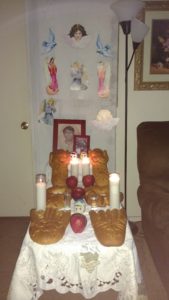
Honoring Mi Abuelito Frank Cortez
Alter Project
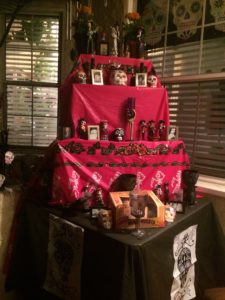
Honoring my Grandfather, Jose
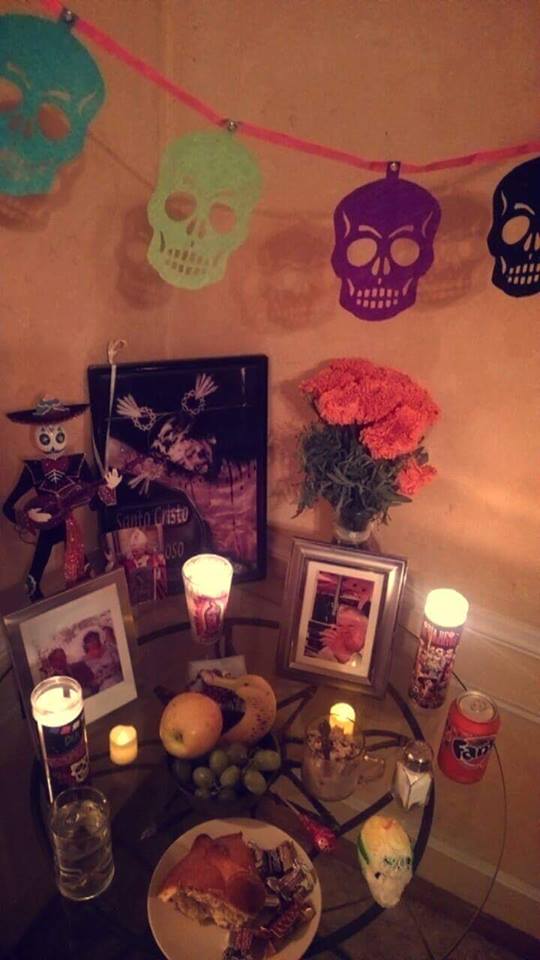
Altar Exhibit For My Uncle, Ricardo
Week 10: “The Rain God”
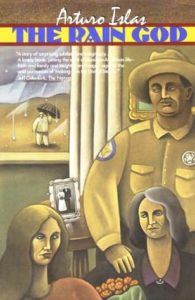
“The Rain God” by Arturo Islas, is a novel about a Mexican family living in the United States of America. Islas writes about different characters in his novel, and first he starts off with Miguel Chico. Miguel Chico is the son of Miguel Grande and Juanita. Miguel Chico is the only family member to have a higher education and decides to go to College in San Francisco. Miguel Chico distances himself from the family, so the family raises suspicion towards him. Miguel Chico is not married, so his family suspects him of being gay. Miguel Chico’s father, Miguel Grande, did not allow him to play with dolls and wanted Miguel Chico to become a man due to Miguel Grande Macho-ness. Miguel Grande was an individual who was very patriarch. He was viewed as “head of the household” and his presence dominated all the family gatherings. although, Islas does not confirm of the character being gay, we can see that Miguel Chico suffers from sexuality in this novel. Some questions I have are, Why do you think the author, Arturo Islas, leaves us wondering if Miguel Chico was gay or not? Was it because many Chicano/s would not accept his book? Does the Chicano/a Family have an influence in this??

